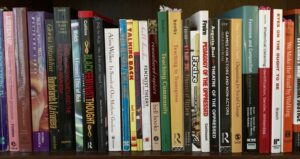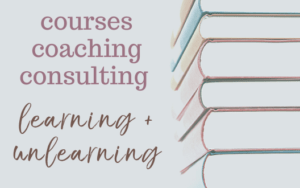
To provide a visualization of resources for racial justice, this photo shows colorful spines of books by Gloria Anzaldúa, Augusto Boal, Patricia Hill Collins, Paulo Freire, bell hooks, Audre Lorde, Elaine Richardson, and Alice Walker, among others.
We’re in a time of urgent and important work for racial justice: lots of action alongside lots of learning and unlearning. I’m deeply grateful for the leadership, actions, and visions offered through the Movement for Black Lives Matters. I’m deeply grateful for people reaching out, being in the streets, organizing actions, holding space, and diving deep into hurt and rage and grief and more. And I’m deeply grateful for being called to this work: both in this moment and for the long haul.
Toward sustaining momentum for everyday racial justice work (work rooted in long-haul commitments), I want to share a few resources that I’m particularly appreciative for this week. These resources suggest ways to be in work of racial justice every day: doing intrapersonal, interpersonal, and institutional work (all three of which are needed by each of us).
I keep asking myself where I’m putting my energy and where more I need to show up—vulnerably, humbly, and alongside others. Among the questions I’m sitting with now are:
- How am I in—and out—of integrity?
- How can I show up and act responsibly at this time?
- When and how do I betray my commitments?
- What needs to change so that I’m building a more accountable life?
- What do I need to change—to release, rethink, reconcile, remove, rework, repair? To adapt and emerge into? To shake up/off in order to act on commitments to justice?
With no easy answers but holding these questions close, I want to affirm—again and always—that the work of everyday living for justice is unequivocally intended to affirm that Black lives matter, to dismantle whiteness and white supremacy, and to work against anti-Black racism and structural violence.
As I attempt to discern what’s called of me at this moment, I’m thinking again (and always, as everyday practice) about my role as a white educator, facilitator, writer, and researcher. I make mistakes and do harm, while striving toward racial justice. Accountability is important, and I’m in this work long haul. This means that I’m grateful for feedback, criticisms, suggestions, and more. I don’t expect you to reach out, but I’m also open and listening. And I’m particularly sitting with this quote, which runs through my body:
“We are all teachers, and what we teach is what we need to learn, and so we teach it over and over again until we learn it.” —A Course in Miracles
Thanks for being in this everyday work, and may these resources offer support,
Beth
* * * * *
Resources for Racial Justice
1. If you’re longing to unlearn white body supremacy, do this free online course with trauma specialist Resmaa Menakem:
“Free Racialized Trauma Course by Cultural Somatics Institute”
Context from Menakem: “We all need different spaces and ways to talk about white body supremacy. Engaging in a culturally somatic body focused study will help us begin to co-create a culture free from the rabid structural influence of white body supremacy that collectively binds us.”
2. If you’re wanting support with grieving and recognizing racial trauma in this moment, listen to this new podcast with chaplain Zeena Regis:
“1001 New Worshiping Communities Podcast, Season 5, Episode 1: Zeena Regis”
Context from 1001 New Worshiping Communities: “Zeena Regis is a Decatur, Georgia, based hospice chaplain and grief recovery specialist. Zeena is an expert at holding space at the end of life, one of the most sacred aspects of spiritual care and most life-giving and transformative ways of pastoring somebody. In our conversation we talk about being a black woman in chaplaincy, racial inequality in the healthcare system, and what allyship looks like.”
3. If you’re wanting a framework for how white people can contribute to racial justice, check out this article from educator Shelly Tochluk:
“On-ramps and Lanes on the Racial Justice Freeway”
Context from Tochluk: “As the appreciation for one another can often seem in short supply (both among white anti-racist people as well as within other social justice communities), this lays out some guidance that white folks engaged in anti-racism efforts might follow in order to avoid creating unnecessary traffic jams and accidents on the journey toward a collective liberation that will benefit people of all backgrounds.” And: “My primary goal in offering this piece is to encourage us to uplift one another on this journey. Racial justice is too important for us to be running each other off the road.”
4. If you’re having conversations about racism, review and use these definitions offered by educator David E. Kirkland:
“What Is Racism? Unpacking the Seven I’s”
Context from Kirkland: “There are at least seven different expressions of racism—what I call the seven “I’s,” building on the work of race scholars who have sought to define racism in greater complexity to interrupt monolithic notions that predominate mainstream understandings of the concept. The point of pulling racism apart in this way is not to overly simplify it. Indeed, many if not all of the “I’s” are constantly working together, flattening on top of and living fluidly within each other in ways that make it nearly impossible to distinguish one expression of racism from another. Still, it is important to name the differences, to operationalize the ways that racism as a complex system functions at multiple levels. So what is racism?”
5. If you’re wanting community resources, including BIPOC-led organizations to follow and support, check out this resource list from the podcast Irresistible:
“Healing Resources for BIPOC Organizers & Allies Taking Action for Black Lives”
Context from Irresistible: “[Here] is a list of resources to support your mind-body-soul in this moment. It includes quick tune-ups for your nervous system, Black-led sessions on healing from racialized trauma, education and practices for allies showing up in solidarity, and a final section intended to help you understand this political moment and a few strategic lenses for the long haul.”
6. If you’re noticing or engaged in healing racial trauma, check out this compilation of articles, videos, and embodied practices by cultural somatics practitioner Tada Hozumi:
“A Cultural Somatic Reader on Whiteness, Trauma, and Allyship (includes free webinar)”
Context from Hozumi: “This is a compilation of selected articles that I’ve written over the last four years, plus a free webinar, on the subjects of whiteness, trauma, and allyship. Particularly, within these works, you will be introduced to what we call a ‘cultural somatic‘ framework, a constellation of ideas pivoted around the fundamental principle that groups of people i.e. cultures are in fact bodies. In this framework, oppressions such as white supremacy are understood as manifestations of traumas held in our collective nervous systems, which in turn become embodied in our cultural systems.”
7. If you’re making apologies and taking accountability, review and practice with these resources provided by activist Mia Mingus:
“How to Give a Good Apology Part 1: The Four Parts of Accountability”
“How to Give a Good Apology Part 2: The Apology—the What and the How”
Context from Mingus: “Apologizing well is a fundamental part of accountability. It is a skill that we should all understand and practice consistently. You cannot take accountability if you do not know how to apologize well.” And: “Practice, practice, practice. … Identify all the many qualities and skills sets you need to develop in your self: active listening; accountable sharing; self awareness and self reflection; asking for help, especially with more challenging apologies; rebuilding trust; making amends; healing your own trauma; learning how to not spiral into a puddle of shame when you make even the smallest of mistakes; knowing what your values are and how you practice them every day, week, and month.”
* * * * *
And an Offering:
As I continue to discern what I’m called to in this moment (a lot of personal accountability work and work with white folks wanting to build more accountable lives), I’m also feeling called to offer free coaching and Reiki, so let me end with an offering:
For white folks who want to build accountability (to recognize, take action, and repair harm that we do through whiteness and white privilege), I’d be happy to offer a session.
For Black, Indigenous, and people of color (BIPOC): if working with a white educator-healer-writer feels good in your body (no assumptions that it does!), I’d be happy to offer a session to talk through writing projects or career discernment or to do Reiki.
Reach out if you’d like to schedule a session.
—
This post is written by Beth Godbee, Ph.D. for Heart-Head-Hands.com. For related posts, you might try “Countering Resistance Fatigue with a Both/And Approach” and “3 Reasons to Participate in the 40-Day Practice on Strengthening Emotional Literacies to Counter White Fragility.”
Become a subscriber via Patreon to receive ongoing support for your efforts of striving to live for justice (social, racial, and environmental justice). And consider subscribing to the newsletter for additional resources and announcements. Thanks!



Leave a Reply